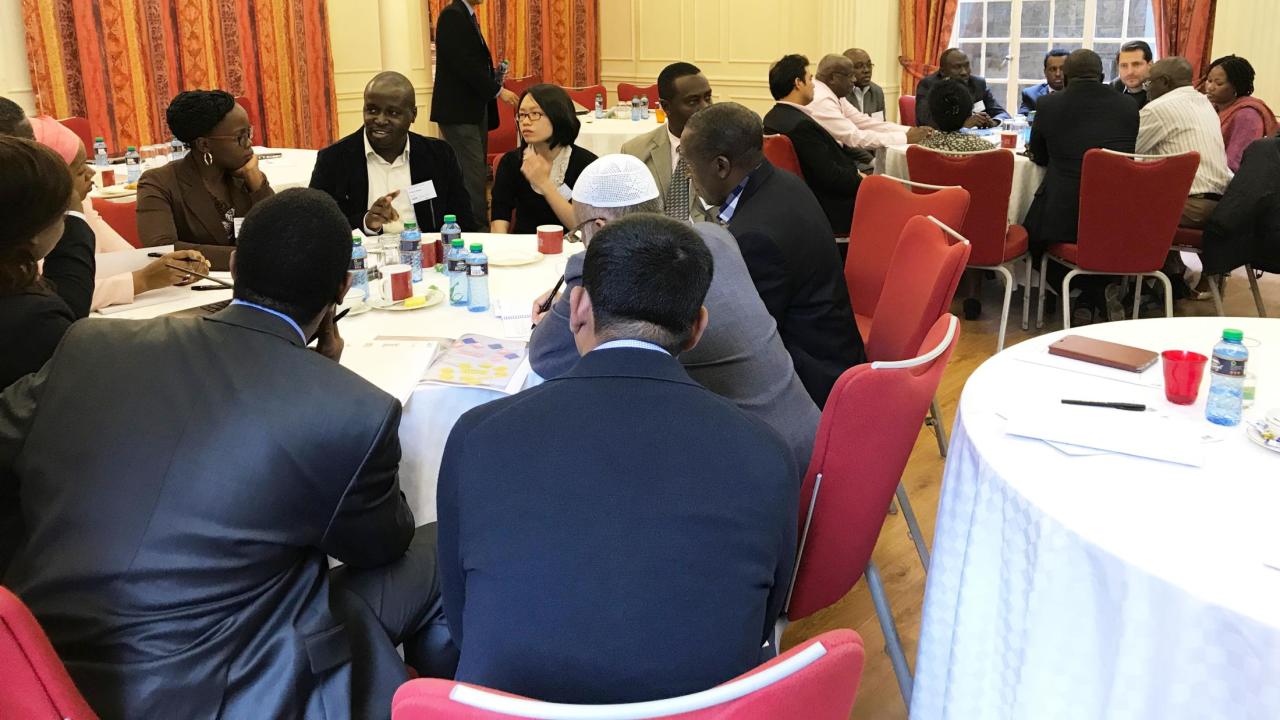
Peer Learning Platform for Agricultural Insurance Event in Kenya Connects Policy to Markets
A workshop in Kenya on July 4-5, 2017 provided a platform for sharing knowledge that can help agricultural insurance to achieve market scale and development impact for poor and vulnerable agriculturalists worldwide.
The International Labour Organization and the Feed the Future Innovation Lab for Assets and Market Access I4 initiative organized this first Peer Learning Platform event that hosted representatives from nine countries across Africa and Asia from a range of institutions including ministries of agriculture, the finance sector, social development, central banks, insurance regulators and planning commissions.
“There has been a lot of success in very specific contexts with agricultural insurance but we haven’t seen scaling or advancement more broadly,” said Tara Steinmetz, assistant director of the Feed the Future Innovation Lab for Assets and Market Access. “The event was for policymakers and others in the development sector to learn how to have this kind of success in their own countries.”
The topics focused on the critical role governments and regulatory bodies play in building more accessible and responsible markets for agricultural insurance products. A broader strategy includes investments in infrastructure to capture weather data, providing smart subsidies, leveraging agriculture extension services, national education campaigns, and appropriate regulation and consumer protection.
“The private insurance industry in isolation is unable to overcome challenges related to agricultural insurance,” said Pranav Prashad, a senior technical officer with the International Labour Organization’s Impact Insurance Facility.
The Promise of Agricultural Insurance for Development
Agricultural insurance holds tremendous promise for reducing poverty while increasing resilience and independence. It may also help to reduce the need for emergency food aid after recurring and predictable disasters, like drought or flood, which some argue builds a reliance on government support.
“What the government hopes to achieve is to discourage this aspect of free food distribution,” said Richard Kyuma, who leads the implementation unit for the Kenya Livestock Insurance Program (KLIP). “If you go the insurance way, although it’s social protection you stand the chance of engineering a social transformation,” added Kyuma.
KLIP, launched in 2015 to protect northern Kenya’s pastoralist communities, has become a model for the successful scaling of an agricultural insurance safety net program for vulnerable populations. In February, 2017, KLIP paid out nearly Ksh 215 million (about US $2 million) to over 12,000 pastoral households at risk of losing livestock to drought.
At the event, representatives from specialised institutional arrangements in various countries, including the Agriculture Transformation Agency (ATA), the Public Financial Enterprises Agency (PFEA) in Ethiopia and the Nigeria Incentive-Based Risk Sharing System for Agriculture Lending (NIRSAL) shared how they are assisting government ministries in implementing financial services-based agriculture programs.
Ensuring Client Value Can Make Programs Sustainable
Steinmetz facilitated a session on enhancing the understanding of what factors underlie client value in agricultural insurance. Client value is essential for all agricultural insurance, she said, because it ensures that the products don’t leave vulnerable farmers who purchase them worse off. Client value is also especially important if the insurance is supported by government.
“Maintaining high client value in all insurance products isn’t just important to achieve development impact,” said Steinmetz. “For long-term sustainability you have to provide high value to your clients. This is something all sectors should focus on as an objective.”
The program also included a number of interactive sessions for participants to learn from a range of experiences in a structured way. Small group discussions and roundtable panel presentations with representation of different functions and different countries provided an opportunity for participants to learn how similar challenges have been overcome.
“We’ve seen the Kenyan experience again and again and again,” said Cynthia Ayero, an inspection officer with the Insurance Regulatory Authority of Uganda. “I’m hoping soon we will have a Ugandan experience as well. The trick we are having is how to scale.”
This Peer Learning Platform event was an activity of the Global Action Network (GAN), a USAID -funded partnership between the International Labour Organization's Impact Insurance Facility and the Feed the Future Innovation Lab for Assets and Market Access.
The countries represented at the event included Bangladesh, Ethiopia, Ghana, Kenya, Nigeria, Pakistan, Tanzania, Uganda and Zambia. Participants included the director general of the PFEA, the director of the Tanzanian Insurance Regulation Authority (TIRA) and the director of the State Bank of Pakistan. In addition, development sector organisations like USAID, WFP, IFAD and their partners on local projects also shared their thoughts and experiences.
Learn more about the event at the International Labour Organization's Impact Insurance Facility.
